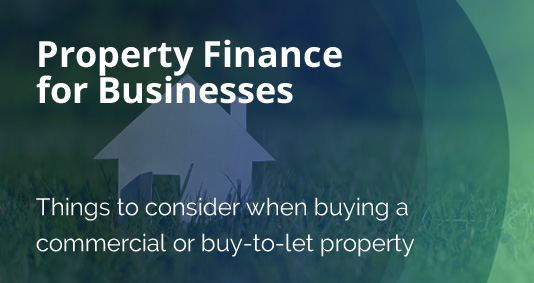
Property finance for businesses – helping your growth plans
Whether you’re looking to buy premises for your business, or invest in a buy-to-let property, choosing the right commercial property and finance is critical to the success of your business.

Whether you’re looking to buy premises for your business, or invest in a buy-to-let property, choosing the right commercial property and finance is critical to the success of your business.
Buying business premises or commercial investments – things to consider
Owning your own premises can be a great way of growing your business. With a Commercial Mortgage you can benefit from any increase in the property value and you don’t have the constraints that can be associated with renting.
Do remember you'll be taking on some additional risk and responsibility when owning a property. If you rent your premises, you can move quickly and easily, but you are vulnerable if your landlord decides to sell the property or increase rents.
Buy to Let and Holiday lets
With the boom in staycations, the popularity of buying a property for holiday lets has grown during the time of the pandemic.
Whether you are buying a single property or adding to an existing property portfolio, the opportunities to arrange competitive finance options are growing.
We have partnered with Finpoint to bring you a team of business specialists who can help you explore the options available from their panel of specialist lenders.
Things to think about
Choose the location carefully
Pay as much attention to the location of your commercial premises or investment properties as you would when buying your own home. Will the location work positively for you, your staff and of course your customers.
Rent or buy?
The costs of buying a commercial property, particularly with a mortgage, will likely exceed the cost of renting the same property.
A deposit will be needed to secure a loan and remember to budget for the ongoing maintenance of the property and running costs. Some of these costs, particularly with holiday lets, can be tax-deductible. Please confirm the availability of these with an appropriate expert.
Whether you are buying a single property or adding to an existing property portfolio, the opportunities to arrange competitive finance options are growing.
Keep flexibility in mind
If all goes well, your business is likely to expand and change during the time that you own the property. Make sure you choose a commercial premises that can be adapted as your business grows.
Sub-letting
You should consider retaining the option of sub-letting part of your premises. This can be an excellent way of raising additional income. Do make sure your loan provider allows sub-letting as part of your loan agreement.
Alongside your loan interest costs, there are other fees to consider when arranging a loan. Make sure you include in your budgets.
Arrangement fees – These normally come in at 0.75% to 2.5% of the overall value. This could also include a commitment fee on acceptance of the mortgage offer.
Valuation fee – lenders will engage an independent valuer to conduct their own assessment of the property as a condition of an offer, so be sure to ask if this applies.
Legal fees – commercial mortgages are often more complex than residential, so the legal fees tend to be higher. In addition to your own fees, there may be some costs you need to cover for the lender. Find out how this works upfront to get a clear picture of total costs.
What other options are there?
The current lending market is giving businesses more options in terms of commercial mortgages;
Access property finance, we can help
Whether you are considering your first commercial property investment or you are a seasoned property investor, we can help you find the funding you need, apply here.
Finpoint is free to use for members. We’re 100% transparent about fees and rates, and give you access to the UK’s largest panel of business lenders. We’re also 100% independent. Our only interest is in making sure you get the right business finance.
We're always working to support our Credit Passport community by bringing the best solutions to safeguard businesses, build resilience and reduce business risk overall.
Remember to sign in regularly and check your Credit Passport offers page to see matched offers, tailored to your business. If you don't have an account, register for free here